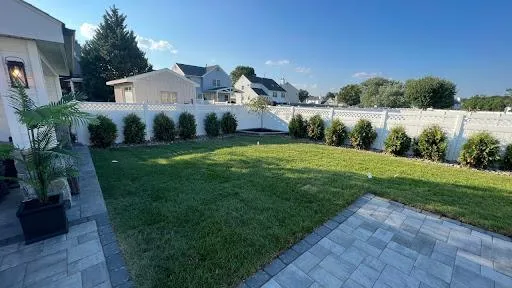BLOGS

What Are Some Eco-friendly Landscaping Practices To Consider?
Eco-friendly landscaping practices include using native and drought-tolerant plants, implementing rainwater harvesting and smart irrigation systems, composting and mulching, choosing sustainable hardscaping materials, creating wildlife habitats, and maintaining healthy soil with organic amendments.
In the quest for creating beautiful and functional outdoor spaces, eco-friendly landscaping has emerged as a crucial practice. Adopting sustainable landscaping techniques not only enhances the beauty of your garden but also contributes positively to the environment. By integrating various eco-friendly practices, you can create a vibrant and resilient outdoor space that supports biodiversity and conserves natural resources.
At Freedom Landscaping, New Jersey's premier landscaping company, we embrace these principles to deliver exceptional results while respecting our planet. Here’s a guide to some essential eco-friendly landscaping practices that can transform your outdoor spaces.
Key Takeaways
Native Plant Selection: Opt for plants that are indigenous to your area for reduced water and maintenance needs.
Water Conservation Techniques: Use rainwater harvesting, drought-resistant plants, and smart irrigation systems to save water.
Composting and Mulching: Enrich soil and reduce waste by composting organic materials and using mulch.
Eco-Friendly Hardscaping: Choose recycled or locally sourced materials and use permeable paving solutions.
Wildlife-Friendly Practices: Create habitats for local wildlife and use Integrated Pest Management (IPM) to avoid harmful chemicals.
Soil Health: Test and amend soil regularly to maintain fertility and improve water retention.
Native Plants for Sustainable Landscaping
Selecting native plants is fundamental to eco-friendly landscaping. Native plants are specifically adapted to the local soil, climate, and weather conditions, making them more resilient and easier to maintain than non-native species. They require less water, fertilizer, and pesticide, reducing the environmental impact of your garden. Additionally, native plants play a crucial role in supporting local wildlife. They provide essential habitats and food sources for birds, insects, and other animals, which helps maintain and enhance local biodiversity. For instance, native flowering plants attract pollinators such as bees and butterflies, which are essential for the health of many ecosystems.
By incorporating native plants into your garden, you create a beautiful, low-maintenance space that aligns with sustainable practices. These plants not only thrive with minimal input but also contribute positively to the local environment. They help reduce the strain on local water resources and lower the need for chemical inputs, making them an ideal choice for eco-conscious gardeners.
Key Benefits:
Reduced Maintenance: Requires less water, fertilizer, and pesticides.
Biodiversity Support: Provides habitats for local wildlife.
Environmental Harmony: Adapts well to local soil and climate.
Techniques for Effective Water Conservation
Water conservation is crucial for sustainable landscaping, particularly in regions affected by drought. Implementing water-saving techniques can dramatically reduce water usage and environmental impact. One effective strategy is to harvest rainwater using barrels or cisterns. This collected water can be used to irrigate your garden, reducing reliance on municipal water sources and saving money on water bills. Additionally, selecting drought-resistant plants that can thrive with minimal water helps conserve resources while maintaining a healthy garden. These plants are designed to withstand periods of low water availability, reducing the need for frequent irrigation.
Smart irrigation systems are another valuable tool. These systems adjust watering schedules based on current weather conditions, ensuring that plants receive the right amount of water without waste. By integrating these techniques, you can enhance the efficiency of your garden’s water use, conserve valuable resources, and maintain a lush, green space.
Water Conservation Tips:
Rainwater Harvesting: Collect rainwater for irrigation.
Drought-Resistant Plants: Choose plants that need less water.
Smart Irrigation Systems: Use technology to optimize watering.
The Benefits of Composting and Mulching
Composting and mulching are integral to eco-friendly landscaping, offering numerous environmental and practical benefits. Composting involves the decomposition of organic waste, such as kitchen scraps and yard clippings, into nutrient-rich material that can be added to soil. This practice reduces the amount of waste sent to landfills and enriches the soil with essential nutrients, promoting healthier plant growth. Composting also helps reduce the need for chemical fertilizers, which can be harmful to the environment.
Mulching, on the other hand, involves covering the soil with organic materials like wood chips, leaves, or straw. This layer helps retain soil moisture, suppress weeds, and regulate soil temperature. As mulch decomposes, it improves soil quality by adding organic matter, which enhances soil fertility and structure. Both composting and mulching are sustainable practices that contribute to a healthier garden ecosystem by promoting soil health and reducing the reliance on chemical inputs.
Composting and Mulching Benefits:
Enhanced Soil Health: Provides essential nutrients and improves soil structure.
Moisture Retention: Helps keep soil moist and reduces evaporation.
Weed Suppression: Reduces the growth of weeds naturally.
Choosing Eco-Friendly Hardscaping Materials
Selecting eco-friendly materials for hardscaping is essential for reducing your environmental footprint. Recycled materials, such as reclaimed bricks or concrete, are sustainable alternatives to new materials. Using these materials minimizes waste and reduces the demand for new resources. Locally sourced stones are another excellent choice as they reduce transportation impacts and support local economies.
Permeable paving solutions are particularly effective in managing stormwater. These materials allow water to infiltrate the ground rather than run off, which helps reduce erosion and manages water flow more efficiently. By choosing sustainable hardscaping materials, you contribute to a healthier environment while creating attractive and functional outdoor spaces.
Eco-Friendly Hardscaping Options:
Recycled Materials: Use reclaimed bricks or concrete.
Locally Sourced Stones: Reduce transportation impacts.
Permeable Paving: Enhance water infiltration and reduce runoff.
Creating Wildlife-Friendly Gardens
Creating wildlife-friendly gardens is a vital aspect of sustainable landscaping. By incorporating features such as birdhouses, bee hotels, and butterfly gardens, you provide essential habitats for local wildlife. These features support various species by offering food, shelter, and breeding grounds. Avoiding harmful pesticides is equally important; instead, employ Integrated Pest Management (IPM) techniques, which use natural predators and biological controls to manage pests.
Fostering a garden that supports wildlife not only enhances biodiversity but also contributes to the ecological balance of your area. A wildlife-friendly garden becomes a haven for birds, bees, butterflies, and other beneficial creatures, enriching the local ecosystem and making your outdoor space more vibrant and lively.
Wildlife-Friendly Garden Features:
Birdhouses and Bee Hotels: Provide shelter and nesting sites.
Butterfly Gardens: Attract and support pollinators.
IPM Techniques: Manage pests naturally without chemicals.
FAQs
1. What are the benefits of using native plants in landscaping?
Native plants are adapted to local conditions, requiring less water and maintenance. They also support local wildlife and contribute to biodiversity.
2. How can I conserve water in my garden?
You can conserve water by harvesting rainwater, using drought-resistant plants, and installing smart irrigation systems that adjust based on weather conditions.
3. Why is composting important for landscaping?
Composting reduces waste and enriches soil with nutrients, promoting better plant growth and reducing the need for chemical fertilizers.
4. What are eco-friendly alternatives to traditional hardscaping materials?
Recycled materials, locally sourced stones, and permeable paving options are sustainable alternatives to traditional hardscaping materials.
5. How can I make my garden more wildlife-friendly?
Create habitats with features like birdhouses and bee hotels, avoid using harmful pesticides, and employ Integrated Pest Management (IPM) techniques.
Embrace Sustainable Landscaping with Freedom Landscaping
Incorporating eco-friendly landscaping practices is essential for creating a beautiful, sustainable outdoor space. By choosing native plants, conserving water, composting, using eco-friendly materials, and supporting wildlife, you contribute to a healthier environment and a vibrant garden.
Contact us now at Freedom Landscaping to discover how our eco-friendly landscaping solutions can transform your outdoor space. Freedom Landscaping, New Jersey's premier landscaping company, is committed to these sustainable practices, ensuring that every project we undertake not only enhances your outdoor space but also respects the planet.
Ready To Give Your Property The Love It Deserves?
Whether it is keeping your lawn professionally maintained or completely re-vamping the look of your landscape, let our team of professional landscapers at Freedom Landscaping take your property to a whole new level!
Contact Us
Mon - Sat: 7:00 am - 6:00 pm
Sunday: Closed
© 2025 Freedom Landscaping LLC. All Rights Reserved. Privacy Policy. Terms & Conditions. Web Design By Fused Media.


